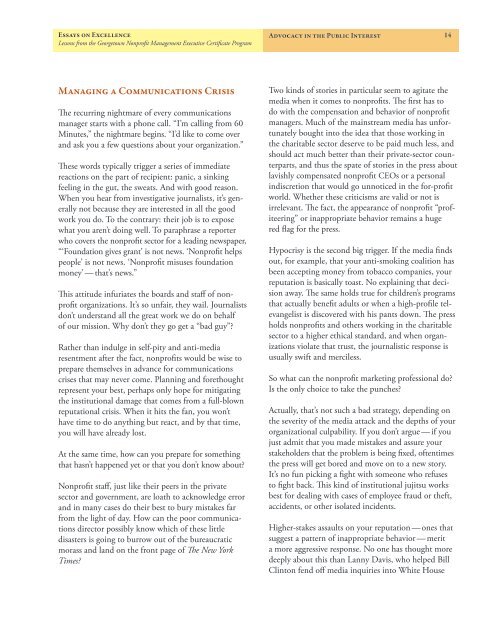Nonprofit Marketing
Nonprofit Marketing
Nonprofit Marketing
Create successful ePaper yourself
Turn your PDF publications into a flip-book with our unique Google optimized e-Paper software.
Essays on Excellence<br />
Lessons from the Georgetown <strong>Nonprofit</strong> Management Executive Certificate Program<br />
Advocacy in the Public Interest 14<br />
Managing a Communications Crisis<br />
The recurring nightmare of every communications<br />
manager starts with a phone call. “I’m calling from 60<br />
Minutes,” the nightmare begins. “I’d like to come over<br />
and ask you a few questions about your organization.”<br />
These words typically trigger a series of immediate<br />
reactions on the part of recipient: panic, a sinking<br />
feeling in the gut, the sweats. And with good reason.<br />
When you hear from investigative journalists, it’s generally<br />
not because they are interested in all the good<br />
work you do. To the contrary: their job is to expose<br />
what you aren’t doing well. To paraphrase a reporter<br />
who covers the nonprofit sector for a leading newspaper,<br />
“‘Foundation gives grant’ is not news. ‘<strong>Nonprofit</strong> helps<br />
people’ is not news. ‘<strong>Nonprofit</strong> misuses foundation<br />
money’ — that’s news.”<br />
This attitude infuriates the boards and staff of nonprofit<br />
organizations. It’s so unfair, they wail. Journalists<br />
don’t understand all the great work we do on behalf<br />
of our mission. Why don’t they go get a “bad guy”?<br />
Rather than indulge in self-pity and anti-media<br />
resentment after the fact, nonprofits would be wise to<br />
prepare themselves in advance for communications<br />
crises that may never come. Planning and forethought<br />
represent your best, perhaps only hope for mitigating<br />
the institutional damage that comes from a full-blown<br />
reputational crisis. When it hits the fan, you won’t<br />
have time to do anything but react, and by that time,<br />
you will have already lost.<br />
At the same time, how can you prepare for something<br />
that hasn’t happened yet or that you don’t know about?<br />
<strong>Nonprofit</strong> staff, just like their peers in the private<br />
sector and government, are loath to acknowledge error<br />
and in many cases do their best to bury mistakes far<br />
from the light of day. How can the poor communications<br />
director possibly know which of these little<br />
disasters is going to burrow out of the bureaucratic<br />
morass and land on the front page of The New York<br />
Times?<br />
Two kinds of stories in particular seem to agitate the<br />
media when it comes to nonprofits. The first has to<br />
do with the compensation and behavior of nonprofit<br />
managers. Much of the mainstream media has unfortunately<br />
bought into the idea that those working in<br />
the charitable sector deserve to be paid much less, and<br />
should act much better than their private-sector counterparts,<br />
and thus the spate of stories in the press about<br />
lavishly compensated nonprofit CEOs or a personal<br />
indiscretion that would go unnoticed in the for-profit<br />
world. Whether these criticisms are valid or not is<br />
irrelevant. The fact, the appearance of nonprofit “profiteering”<br />
or inappropriate behavior remains a huge<br />
red flag for the press.<br />
Hypocrisy is the second big trigger. If the media finds<br />
out, for example, that your anti-smoking coalition has<br />
been accepting money from tobacco companies, your<br />
reputation is basically toast. No explaining that decision<br />
away. The same holds true for children’s programs<br />
that actually benefit adults or when a high-profile televangelist<br />
is discovered with his pants down. The press<br />
holds nonprofits and others working in the charitable<br />
sector to a higher ethical standard, and when organizations<br />
violate that trust, the journalistic response is<br />
usually swift and merciless.<br />
So what can the nonprofit marketing professional do?<br />
Is the only choice to take the punches?<br />
Actually, that’s not such a bad strategy, depending on<br />
the severity of the media attack and the depths of your<br />
organizational culpability. If you don’t argue — if you<br />
just admit that you made mistakes and assure your<br />
stakeholders that the problem is being fixed, oftentimes<br />
the press will get bored and move on to a new story.<br />
It’s no fun picking a fight with someone who refuses<br />
to fight back. This kind of institutional jujitsu works<br />
best for dealing with cases of employee fraud or theft,<br />
accidents, or other isolated incidents.<br />
Higher-stakes assaults on your reputation — ones that<br />
suggest a pattern of inappropriate behavior — merit<br />
a more aggressive response. No one has thought more<br />
deeply about this than Lanny Davis, who helped Bill<br />
Clinton fend off media inquiries into White House

















